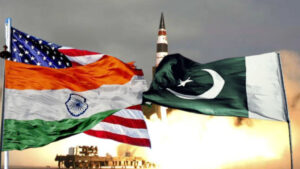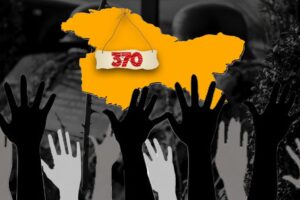By Farooq Ahmed Kirmani
“To robbery, butchery and rapine, they give the lying name of ‘government’; they create a desolation and call it peace.” – Tacitus
The tragic tale of the Article-370 is but a metaphor for the hideous history of Kashmir: robbery, butchery and rapine – legislative, economic, moral — of hapless Kashmiris held hostage at gunpoint by the ‘government’ and the deathly desolation they are calling peace. In its own tryst with destiny, Muslim Kashmir experienced only deceit, deception and dishonesty in Hindu India. At the stroke of the midnight hour, in 1947, when the world slept, a new dawn of enslavement was being unleashed in Kashmir.
The deceit, deception and dishonesty started at the very outset. The Article-370, in absence of the Praja Parished, a constituent assembly or any other representative agency, constitutionally, takes birth from the instrument of accession (IoA). Several historians and researchers have inferred that the so-called instrument of accession did not exist, or was fraudulently ante-dated to justify India’s invasion of the disputed Kashmir State [1]. For example, George Irani, Judy Carter, and Vamık Volkan (“Regional and Ethnic Conflicts: Perspectives from the Front Lines”); Alastair Lamb (“Incomplete Partition, Kashmir: A disputed legacy 1846-1990”, and “Birth of a Tragedy”); Avtar Singh Bhasin (“India and Pakistan: Neighbours at Odds”); Stanley Wolpert (“Nehru: A tryst with Destiny”). In fact, Perry Anderson categorically iterates that “Kashmir became part of India in 1947 ‘with a forged declaration of accession’.” In fact, even a perfunctory perusal of the copy of this forged document, held in the Indian National Archives, reveals two stark things: one, unlike the IoA of other States, say, Udaipur, Mysore etc., there is no official stamp on J&K’s IoA; two, the date it was accepted by the Governor General of India, Mountbatten of Burma, is shown as 27th of October, which happens to be quite “a few hours after India began an airlift of troops to the Kashmir valley (the beginning of a military presence that continues to this day)” [2]. Further, in strict legal terms, when the Maharaja of J&K had already entered into a Stand Still Agreement (SSA) with Pakistan (India refused to sign the said SSA with J&K), what legal legitimacy could there be for his signature to the IoA with the Indian Dominion? No other State entered into a SSA with one Dominion and signed IoA with another Dominion. There is empirical evidence, both direct and indirect, to show that the so-called IoA was a fraud and, thereby, the Article-370, which obtains its legal legitimacy from the IoA, has always been, ab initio, illegitimate, illegal and invalid.
The deceit, deception and dishonesty didn’t stop with the institution of A-370; instead, routine abuse of this ‘article of faith’ started as soon as it was conceived: on May 11, 1953, Shyama Prasad Mukerjee, the founder of the Jana Sangh, illegally crossed the border and entered Kashmir without a valid permit, as was required at the time under Article-370. This crude act of defiance, though dismissed at the time by the myopic Kashmiri leadership as fringe, clearly showed the real feelings and intent of the Hindu India towards Muslim Kashmir’s autonomy [3] Erosion of the A-370 continued under a grand plan. Nehru, on 27th November 1963, declared on the floor of Indian Parliament that “Samvidhan ki dhara 370 ghiste ghiste ghis jaayegi” (Article 370 of the Constitution will disappear by being eroded progressively) … “So we feel that this process of gradual erosion of article 370 is going on. Some fresh steps are being taken and in the next month or two they will be completed. We should allow it to go on” [4]. Accordingly, the “Article 370 was maintained as a mere husk, denuded of all content, and the State’s autonomy a teasing illusion. From defence, foreign affairs and communications in the years between 1947 and 1964, the Union List was extended to 94 out of its 97 topics; 26 out of the 47 in the Concurrent List and 260 Articles out of the 395 Articles of the Constitution. All by executive orders by the President” [5].
The deceit, deception and dishonesty, inherent in India’s national character, can be seen at its worst in India’s repeated promises of a plebiscite to ascertain the popular will of the people. For example, on October 25, 1947, in telegrams to Pakistan and British prime ministers, Nehru said, “I should like to make it clear that the question of aiding Kashmir in this emergency is not designed in any way to influence the State to accede to India. Our view, which we have repeatedly made public, is that the question of accession in any disputed territory of State must be decided in accordance with the wishes of the people and we adhere to this view” [6]. On October 27, 1947, Lord Mountbatten stated, “it is my government’s wish that as soon as law and order have been restored in Kashmir and her soil cleared of the invaders, the question of the state’s accession should be settled by a reference to the people.” Nehru reiterated his promise, in his telegram of October 31, 1947, to Liaquat Ali Khan, he said, “Our assurance that we shall withdraw our troops from Kashmir as soon as peace and order are restored and leave the decision about the future of the State to the people of the State is not merely a pledge to your Government but also to the people of Kashmir and to the world” [7]. On October 17, 1949, the sponsor of Article 370 in India’s Constituent Assembly, M. Gopalaswamy Ayyangar, stated, “It [A-370] will remain “interim” or “temporary” till a plebiscite is held … Again, the government of India have committed themselves to the people of Kashmir in certain respects. They have committed themselves to the position that an opportunity would be given to the people of the state to decide for themselves whether they will remain with the Republic or wish to go out of it. We are also committed to ascertaining this will of the people by means of a plebiscite provided that peaceful and normal conditions are restored and the impartiality of the plebiscite could be guaranteed” [7]. Nehru in the Lok Sabha on 26th June 1952 said, “Let us suppose there was a proper plebiscite there and the people of Kashmir said ‘we do not want to be with India’. Well, we are committed to it. We would accept it. It might pain us but we would not send an army against them. We might accept that, however, much hurt we might feel about it and we would change our constitution about it.” In another important speech in the parliament on 7th August 1952, Nehru again said, “We do not want to win people against their will and with the help of armed force and if the people of Jammu and Kashmir state so wish it to part company from us, they can go their way and we shall go our way. We want no forced marriages, no forced unions like this”. On May 15, 1954, Nehru said India still stands by her international commitments on the Kashmir issue and “will implement them at the appropriate time” [7]. On May 1, 1956, Jayaprakash Narayan wrote to Nehru, “[F]rom all the information that I have, 95 per cent of Kashmiri Muslims do not wish to be or remain Indian citizens. I doubt therefore the wisdom of trying to ‘keep’ people by force where they do not wish to stay. This cannot but have serious long-term political consequences, though immediately it may suit policy and please public opinion” [8].
Pertinent to mention here that the now scrapped Constitution of J&K, that Indians claimed to represent the popular will and bestowed legitimacy to Indian rule in Kashmir was itself unconstitutional. According to A. G. Noorani, “[F]or reasons more than one, the Constitution of Jammu & Kashmir, enacted by its Constituent Assembly on November 17, 1956, is totally void in law and an utter nullity, a non est. Constitutional as well as political morality make it stink.” [9].
The deceit, deception and dishonesty did a naked ‘Tandav’ on August 5, 2019, when India threw away even the fig leaf and illegally trashed the Article 370 of the Indian Constitution. The Indian SC’s subsequent judgement notwithstanding, even a secondary school student can tell that the scrapping was in gross violation of the canons of natural justice. In the words of Anuradha Basin, “[E]ven the pretence of democracy was discarded in doing this, making the residents of Jammu and Kashmir feel emasculated, humiliated and disenfranchised” [10]. A.G.Noorani, the legal luminary living in India, opined that, “[I]t is utterly and palpably unconstitutional. An unconstitutional deed has been accomplished by deceitful means. For a fortnight, the Governor and other people told a whole load of lies” [11]. The President of India ordered the changes on the recommendation of the Governor, a non-Kashmiri Indian citizen, appointed by the President himself. The shameless democracy, without even a shred of popular mandate, carried out the most undemocratic foul judicial murder.
For well-meaning Kashmiris, August 5, 2019, was surreal as it flashed back and confirmed all the deliberations, discussions and debates about India’s betrayal and its nefarious future plans. For me, personally, first time ever in my long life, I wished Sheikh Abdullah hell for dragging Kashmir into this hell-hole. After all Shiekh, against all odds, was the enabler in annexing Kashmir with India and pushing Indian subcontinent into ruin: four (04) wars between India and Pakistan, the human and material costs due to the enmity springing solely from Kashmir dispute and at least 100,000 innocent Kashmiris killed since 1989 alone. If the princely state of Jammu and Kashmir, as agreed between Mountbatten and Patel, had gone to Pakistan, the whole subcontinent would be altogether a different place today: instead of treading a nuclear sword, India could have been equivalent to China; Pakistan/ Bangladesh would be advanced nation at par with South Korea, Japan, Hong Kong etc. with Kashmiris spearheading the Pakistani progress in science, technology, literature, poetry and other fine arts.
India has created a desolation in Kashmir and are calling it peace! India’s treachery may seem to have triumphed for now but in the long run there shall be horrible consequences for the Indian nation as the ever-progressive march of dragon of history shall destroy the deceitful, the deceptive and the dishonest.
REFERENCE:
- India’s claims on Kashmir rest on a dubious legal instrument
- The Backstory of Article 370: A True Copy of J&K’s Instrument of Accession
- Dhar, Anuj: “The Mysterious Death of Shyama Prasad Mukherjee”
- Jawaharlal Nehru on the ‘Erosion’ of Article 370, Lok Sabha, 27 November 1963 Lok Sabha Debates, 27 November 1963, Volume XII, cols 1231-2 Q.
- The J&K conundrum: myths and falsehoods
- Danger in Kashmir by Josep Korbel
- Article 370: A Constitutional History of J&K by AG Noorani
- Jayaprakash Narayan’s letter to Nehru, May 1, 1956 (Bimal Prasad (Ed.), Selected Works of Jayaprakash Narayan ; Vol. 7 ; Manohar; page 115).
- A dubious Constitution by A.G.Noorani
- Anuradha Bhasin: As Supreme Court Rules on Article 370 in J&K, Here’s Why History, Legal Context Matters
- Kashmir: Scrapping Article 370 “Unconstitutional”, “Deceitful” Says Legal Expert A.G. Noorani
The views expressed in this article are solely those of the author and do not necessarily reflect the views of The Global Politico.








